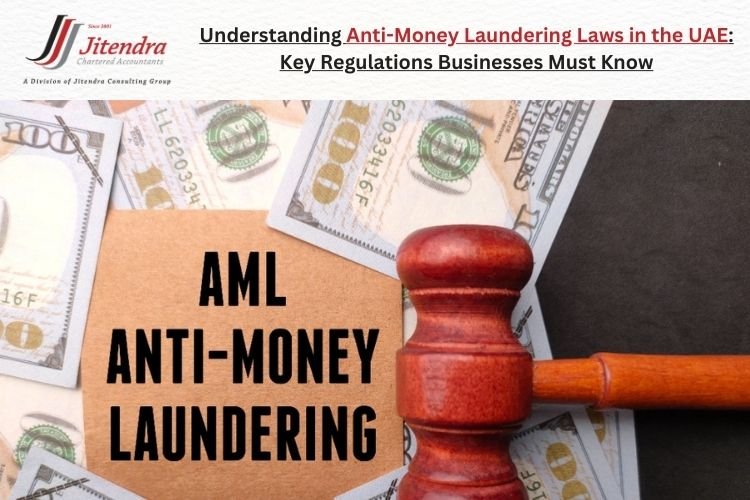
Understanding Anti-Money Laundering Laws in the UAE: Key Regulations Businesses Must Know
The United Arab Emirates has a very strong framework of regulations when it comes to anti-money laundering (AML) and Combating the financing of terrorism (CFT) which is in line with the larger global-level framework of AML/CFT legislation. The purpose of these AML laws is to control financial crimes as much as possible and make the country a safe and secure business destination and investment hub. Businesses must comply with the UAE AML laws and regulations in order to operate smoothly as well as to avoid penalties and disputes with regulatory authorities. Read ahead to learn key AML regulations that businesses should be aware of.
Businesses can also seek guidance from AML compliance consultants at Jitendra Chartered Accountants and learn from experts the best strategies they can employ to stay compliant with the AML regulations in the country.
Key Anti-Money Laundering Regulations in UAE
Following are some AML regulations compulsory to know for businesses in UAE;
-
Know Your Customer
Know your customer approach means that you must keep precise and updated information about your customers along with verifying their identity regularly.
-
Conducting CDD or Customer Due Diligence
CDD involves conducting regular verifications of customer identity and risk assessments. It also involves obtaining important data and documents including customer addresses, identification cards, passports, etc. Moreover, CDD includes continuous monitoring of customer activities and reporting to relevant authorities about suspicious transactions.
-
Fulfilling Reporting Duties
Businesses must fulfil their reporting duties and submit CTRs (Currency Transaction Reports) and STRs (Suspicious Transaction Reports), SARs (Suspicious Activity Reports), and some specific reports (like DPMSR, REAR) to the regulatory authorities regularly. Businesses also need to report transactions of individuals that are sanctioned.
-
Monitoring Transactions
Dealers in Precious and Metals need to monitor every transaction that exceeds the fifty-five thousand dirhams threshold. Reporting of all suspicious transactions to the regulatory authorities is also important. Moreover, records of transactions must be maintained for five years at least.
-
Keeping Records and Information
Keeping records is another important AML regulation that businesses must focus on as it involves not only keeping records of customer information, customer due diligence and transactions but also keeping these in the most accurate and reliable form.
-
Conducting Risk Assessments
Conducting risk assessments regularly to identify and mitigate AML risks is another requirement for businesses. It is also important to integrate effective measures to cope with AML risks.
-
Managing PEPs (Politically Exposed Persons)
Identification and motoring of politically exposed persons both local and foreign is required. Businesses have to execute enhanced due diligence to monitor local and foreign PEPs as well as report their suspicious activities to the regulatory authorities.
-
Comply with CFT Laws
Businesses also need to comply with regulations regarding the financing of terrorism and sanctions. Like, not to conduct any business with persons/ companies listed in the UN Saction List and UAE Terrorists list. Also, they are required to integrate strategies to avoid financing of terrorism.
-
Managing Wire Transfers (for FIs – Financial Institutions)
Obtaining and keeping important data for wire transfers and reporting suspicious ones is another requirement for businesses.
-
Appointing AML Compliance Officer
Businesses are required to have an expert AML compliance officer in place. The presence of a compliance officer is necessary in your organisation and its branches.
-
Conducting Training
Conduct training sessions in your organisation to train every employee and other members about AML and CFT risks. A compliance officer can help in this regard. Such training should be done once or twice a year.
-
Conducting Due Diligence
Customer due diligence must be accomplished to be law compliant and run the businesses risk-free
You can also acquire more information from our AML compliance experts at JCA.
Which Businesses Need to Be Aware of AML Regulations?
All legal and natural persons in the UAE who are involved in the following types of business activities are subject to comply with AML regulations in the country;
- Money service businesses
- Exchange houses
- Finance companies
- Banks
- Insurance businesses
- Investment managers
- Securities and commodities advisors, dealers, and brokers.
- VASPs (Virtual Assets Service Providers)
- Other FIs (Financial Institutions)
- Non-financial businesses including credit companies, funds providers, independent accountants, notaries public, lawyers, dealers in precious metals and stones, real estate brokers and agents and the like.
- Non-profit organisations
- Designated Non-Financial Business and Professions (DNFBPs)
Why Choose Jitendra Chartered Accountants?
At Jitendra Chartered Accountants, you will find AML compliance experts who are qualified and experienced in their field. Our compliance officers will make sure that your business always stays away from AML risks, ultimately leading to business growth and smooth operations.


